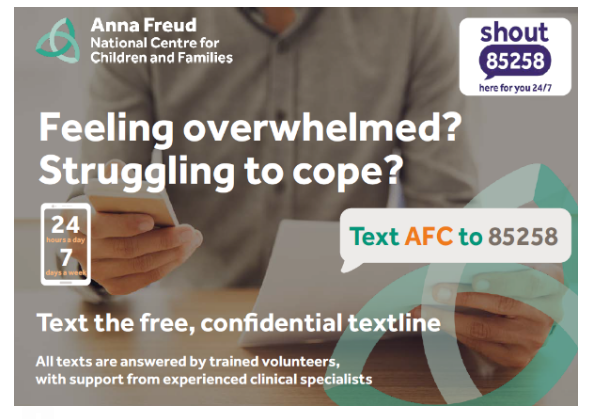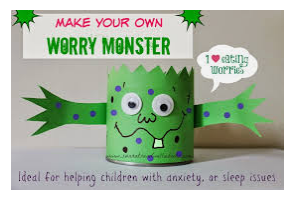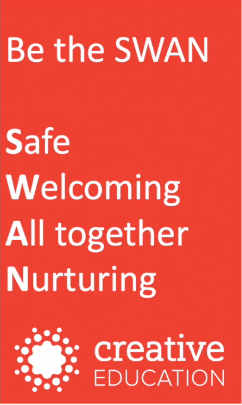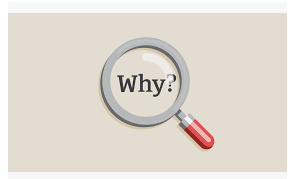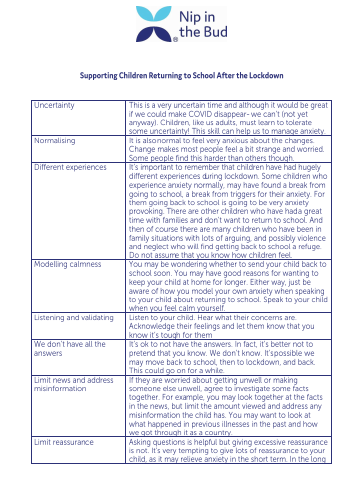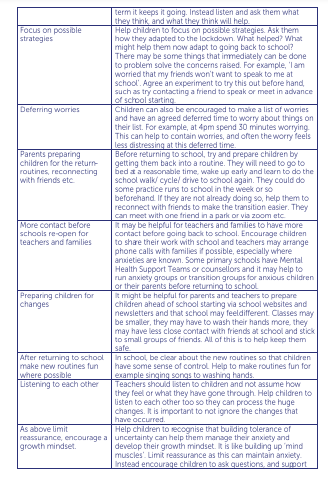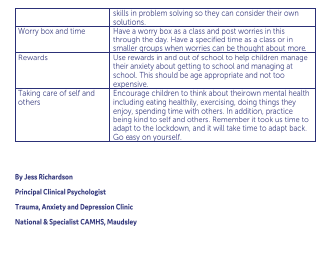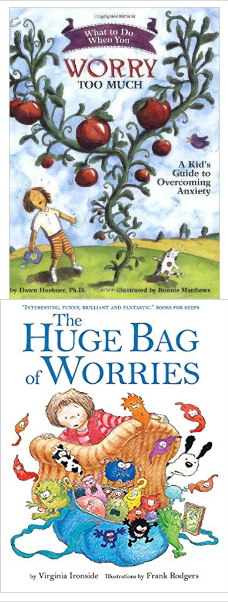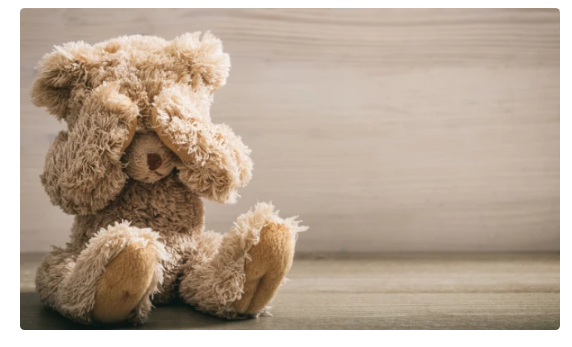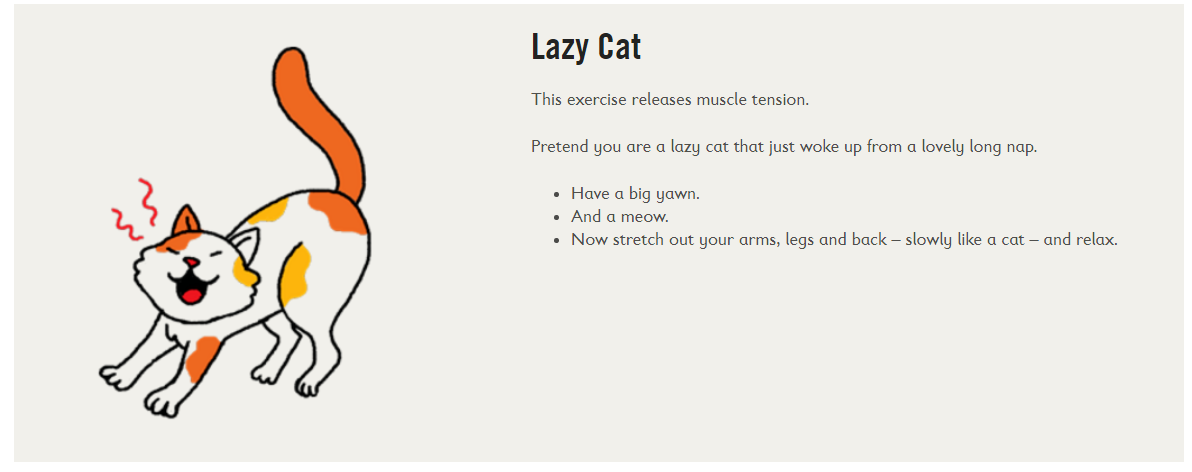Emotional Wellbeing
On Your Mind website – www.onyourmind.org.uk Barnado’s Healthy Minds Wiltshire 0800 157 7015
*For urgent support: 9am – 11pm 01865 903330 or 5pm-11pm 01865 901000 Crisis support https://www.happymaps.co.uk/help-directory/help-in-a-crisis/emergency-help-and-helplines
Young Minds 24 hour Parents Helpline : 0808 802 5544
NHS- recommended Mental Health Helplines
***
Positive Mental Health:
“…. a state of well-being in which every individual realizes his or her own potential, can cope with the normal stresses of life, can work productively and fruitfully, and is able to make a contribution to her or his community”. This definition from the World Health Organization suggests that good mental health is not simply the absence of illness but the ability to thrive.
Welcome to our Emotional Wellbeing Area.
We promote and support children’s positive mental health by offering information and advice for our parents and our pupils, signposts to further specialist agencies and some suggestions for activities which develop emotional literacy, with a strong focus on social and emotional aspects of learning. These include self-awareness, managing feelings, motivation, empathy and social skills.
Please keep checking into this area, as we regularly edit and adapt this section, adding suggestions and resources as your children’s needs change through the course of any further developments.
***Please consider completing the Parent and Pupil Emotional Wellbeing Surveys sent out via Forms/ e-mail a few weeks ago (if you haven’t already), as we are continually trying to respond to requests, queries and concerns, and take on board parent and pupil suggestions and recommendations, and try to re-assure families at this crucial stage. Many thanks.***
“While We Can’t Hug’ - A short video clip from Eoin McLaughlin and Polly Dunbar exploring how we can still show love for each other while we are socially distancing:
A “draw along session” based on the video: https://www.youtube.com/watch?v=NuJsue1NtVs
A story about the importance of staying safe and well at home (e.g. during self-isolation periods):
A Little Guide for Parents on Home Schooling during Lockdown (or self-isolation periods):
“Knowing how to home school is not something parents are born knowing. Even fully trained teachers and those working directly in education, may find themselves thrown as to how to navigate their way through these circumstances flung upon them. Balancing the emotional turbulence of the pandemic and all that comes with it is enough to throw us off kilter. Add to that the media diet of fear and breaking news, social media notifications and a constant stream of conflicting and ambitious information, it can be a minefield to know what to do for the best.” (extract from the above)
The Motivation Mystery Think Piece: which explores “What if we could tap into a child’s inner desire to learn? How could a parent promote learning when their child appears disinterested and unengaged? How could using coaching of self-efficacy, increase internal motivation to learn?”
Guidance on Supporting Children and Young People’s Mental Health and Wellbeing During the Coronavirus (COVID-19) Outbreak- from the DfE
Parenting during COVID-19 - pdf from Triple P
Triple P website and Facebook page - for parenting support
How to WFH without tearing your hair out (7 minute video featuring Dr Pooky Knightsmith)
e-learning self-sooth strategies - from Pooky Knightsmith
Tailored Support for EYFS Parents and Carers: Resources from the Anna Freud Trust
Care for the Family has specific information for parents and carers of children with additional needs as well as general parenting info.
Also a Facebook page.
Supporting Neurodiverse Children In Challenging Times Such As During Self-Isolation - video from NHS East London
A pictorial explanation of the coronavirus (designed primarily for children on the autistic spectrum):
Covid-19 support and advice for parents - from Wiltshire Council
WPCC COVID-19 web pages - from Wiltshire Parent Carer Council
Wiltshire Council's Coronavirus page including details of the new Wiltshire Wellbeing Hub
Coronavirus guidance for carers - from Carers UK
The following might be a good stimulus to help explain the current situation, and to talk about your child’s feelings:
Coronavirus: A Book for Children, illustrated by Axel Scheffler
Emotional literacy resources for children:
Express yourself: Children’s Mental Health Week Toolkit
More free resources for children also available by clicking on this link ELSA (Emotional Literacy)
Wiltshire childrens wellbeing activity pack - from Barnardo's
Mindfulness calendar with 5 minute activities
Drawing and/or writing in a journal : “When we write about how we think and feel each day, it has an incredible effect on how our brains work. Scientists have proven that it can make us feel fantabulous!” (Happy, Confident Me Journal)
Mind of My Own Mindfulness Project
A free journal for the whole family: Happy Self Journal
Here are some more suggestions for activities for the children, especially those receiving ELSA support ( from our Emotional Literacy Support Assistant Mrs Kilgour) or specialist emotional wellbeing support from our Mental Health Champion Mrs Drennan):
Further resources:
Toolkit for building resilience
Resources to support mental health and wellbeing
Resources for managing anxiety and improving wellbeing -Mentally Healthy Schools
Resources for dealing with the effects of lockdown - Mentally Healthy Schools
Our current focus is based around helping families manage the transition back to school as safely, happily and successfully as possible.
Helping your child with anxiety link- Young Minds
Children and Anxiety Leaflet- Anxiety UK
The Anxious Child booklet for parents- The Mental Health Foundation
How to support your child if they are anxious about Coronavirus- Young Minds
Children’s Guide to Coronavirus- The Children’s Commissioner
Separation Anxiety- ELSA chat/support
Reducing separation anxiety tips for parents- Anna Freud
How to support your child’s wellbeing- The Children’s society
Positive Parenting guide- NSPCC
Tips to build resilience- Chelsea Lee Smith
Promoting growth, wellbeing and achievement- Flying colours
We are focussing on re-introducing learning routines and supporting the children with boosting their self-esteem, wellbeing, confidence and learning potential through a whole-school community approach to reintegration:
Aims and Rationale:
SAFE: We want you and your child to feel safe, calm and re-assured, and to know that it will be okay to come back to school. So we are already working on creating an environment that is and feels physically and emotionally safe for all of us, much like the previous return after the first lockdown. We want to build up predictability and consistency around hygiene and other safety rules which school staff will role-model noticeably, and praise your child for following. We will support any child through any misunderstandings and refer to the benefits of what we are doing. These Hand washing education resources and Antibiotic Guardian Youth badge (activities suitable for ages 5 to 18) can be executed easily at home.
WELCOMING: When the children return, we want them to feel excited and happy coming into school and we want them to know that we are genuinely delighted to have them back and to be able to see them again. We have sincerely missed them. They will need to know that they belong, and feel a part of things and we will do everything we can to enable this. Our Downton Values of Love, Peace and Joy will be ever-present and more needed now than ever.
ALL TOGETHER: We need to create a truly inclusive environment in which the children feel surrounded by support, and know that they can rely on all the adults around them so that we are all reinforcing the same messages and sense of togetherness.
NURTURING: Recent research conducted at Reading University highlights the importance of allowing the children time and space to play and to re-connect socially with their peers. We will focus primarily on settling your children in, on meeting their social and emotional needs first and foremost, and on their readiness to learn skills. We will look to provide children with every opportunity to “bounce back” from the last few weeks and months, establishing as much familiarity as possible.
This Covid generation of children are going to be unique, and we want to enable them to flourish which will not be an overnight job. We all have the potential to do a lot of good here, and to repair the rupture that this virus has caused and to prepare our children to be strong adults in the future as well as happy and resilient children in their present.
(Written with huge credit due to Dr Pooky Knightsmith of Creative Education and her online training session: “Supporting a safe and successful return to school”).
Anticipating your child’s concerns:
No-one knows your child as well as you do. It’s important to recognise that each child is unique, and that they may have had very different experiences of Home Learning and staying at home, even within the same family. Many children will naturally have mixed feelings and attitudes about coming back to school.
A tip is to be alert and attuned to how your child is feeling as they might have a particular worry about returning to school that can be addressed. With younger children (3-7), playing together may be your best way of identifying what their concerns are. They often play and draw what they are thinking about, sometimes repeatedly. With older children talking can be easier through a shared activity like walking the dog or baking a cake. Encouraging older children to write a journal could also be beneficial.
Coping with Coronavirus – www.booksbeyondwords.co.uk/coping-with-coronavirus
BW Story App – www.booksbeyondwords.co.uk/bw-story-app
Lenny and Lily in Lockdown and Lenny and Lily Return to School “will help children make sense of their experiences during the coronavirus pandemic, communicate their feelings and prepare for more change as they go back to the classroom. As the stories are told in pictures alone, it is not necessary for children to be able to read words to enjoy them. This means they are appropriate for pupils in both mainstream and special education settings.”
Lenny and Lily in Lockdown wordless story: Lenny and Lily live next door to each other. Every day they walk to school together and play with the same group of friends.
Then one day their teacher explains there is a pandemic. She tells them it means their school will be closing for some weeks and they will be learning at home. Lenny and Lily feel sad and abandoned.
The story explores Lenny and Lily’s experiences of loss and change in the days of the lockdown, how they develop ways of maintaining their friendship, the challenges of learning at home and the range of emotions they each experience.
Lenny and Lily Return to School wordless story: Lenny and Lily have had different experiences of the lockdown, but now it’s time for them to return to school. Lily is excited to go back and meet up with her friends again, but Lenny has enjoyed being at home with his family and feels more anxious.
When Lenny and Lily go back to school they both face different challenges. Lenny struggles to reconnect with his friends and find his place in the group. Lily has found home learning difficult and struggles to keep up with the pace of lessons in class.
The story explores the range of emotions Lenny and Lily experience as they come back into school and rebuild relationships with their teachers and friends.
Our starting points are promoting emotional wellbeing, resilience and recovery.
Parental requests:
For parents who have requested details of how the pandemic might have affected their children and young people in terms of loss, and who “would like some 'truth' around the impact on the children.”
A Recovery Curriculum:
https://www.youtube.com/watch?v=Bvx0-mjT9Tc&feature=emb_imp_woyt (Podcast Episode 1)
Loss and life for our children and schools post pandemic A think piece written by Prof. Barry Carpenter CBE and Matthew Carpenter about the necessity for a Curriculum that is responsive to the needs of children, enabling schools to consider the processes they will need to put in place to successfully transition children back to school. https://www.evidenceforlearning.net/recoverycurriculum/
We are fortunate in being able to access the Jigsaw “Recovery” Package which is a mindful PSHEE scheme involving breathing exercises.
Lesson plans cover:
We adapt and improve this core scheme as we want to personalise our PSHEE provision to meet the needs of our pupils and to reflect our school ethos, vision and values. We will address the following themes:
fear, confusion and uncertainty about the future
managing difficult feelings
managing feelings about change and loss — both positive and negative
how to use healthy coping strategies
ways to reframe negative thinking
signs of emotional or mental ill-health including disrupted sleep patterns and loss of concentration
sources of support in school and wider
ways to support friends and family
• How to re-establish connections with peers and to consider ways of developing new friendship groups
(friends might not have returned to school at the same time or may have been placed in different
‘bubbles’)
• Exploring what it means to belong and how we can help others feel they belong to our groups
• Reminding pupils of support networks in and out of school and revisiting vocabulary and techniques for
accessing help and support
Context and rationale for our intentions:
… because they have an evidence-based foundation in positive psychology and draw upon several key factors which are known to underpin emotional wellbeing.
We are planning activities centred around promoting:
self-efficacy: after feelings of a loss of control, we want the children to feel valued, and that what they say and do matters, that their actions can make a difference, and that they have strengths they can draw on. This core self-belief underpins motivation and emotional wellbeing.
Children need to feel that they are “agents in their own lives.”
hope: which significantly and positively correlates with psychological well-being and coping in the face of adversity as well as being related to better adjustment.
Hope has been called “a personal rainbow of the mind”.
gratitude: taking time to appreciate others and to feel thankful has been found to have physical and psychological benefits. It is also known as a “social glue” that connects people.
This “Giving Tree” in the USA held 400 face masks that one woman made for others
connectedness: social support has a central importance in combating stress and overcoming adversity. We want to create and allow opportunities for the children to re-connect with each other, to co-operate and work as a team, and re-build feelings of togetherness, belonging and community collaboration.
Personal, Social, Health and Economic Education (PSHEE) will have a central role in covering the above and in allowing the children to explore and reflect on their experiences in a safe way, and focus on critical issues such as friendship, emotional wellbeing, change and loss.
We want to allow ample opportunities for the children to share their feelings, experiences, points of view and to feel listened to/heard.
Our strategy will be to re-connect the pupils and to help them feel bonded again through community recovery and bringing the school back together.
https://www.oliverjeffers.com/here-we-are/
This book provides a powerful vehicle for children to reflect on and make sense of the world we are all living in. The words and pictures work together to help children to understand their place in the world and to move forward together in a positive and constructive way.
How we will be supporting positive mental health and well-being:
Personal Journals for each child to note thoughts and feelings;
A class worry box for children to leave notes detailing questions or concerns;
Dedicated mindfulness and reflection sessions embedded into the weekly timetable;
Regular opportunities for prayerful reflection and contemplation;
Identified key staff members who are available to listen and talk with children 1-1 or in smaller groupings;
Designated ‘calm and reflection spaces’ in the school that children can visit to relax;
A dedicated book display in the class book area and the school library featuring titles that explore feelings;
Identifying children who may need additional support and drawing on wider pastoral and therapeutic resources and services to facilitate this. These may include ELSA sessions and “Relax Kids” sessions.
Re-establishing and building relationships:
Many of our children will require support to re-build their strong relationships they once enjoyed in school. They may need to re-learn how to interact in class, take turns and share, problem solve, seek help from an adult when it's needed and know which adults help and keep them safe when they need them. To support this area our curriculum will provide time and space to practise these skills, and ample opportunities to talk to each other.
Please know that you are not alone.
Fully open to all from March 8th…
WELCOME BACK!
Further signposts to a range of local, county-wide and national services:
If you are worried about your child or think that you need advice from professionals, there are a range of local and national services across the UK and Wiltshire including:
Your local GP
Barnado’s Healthy Minds Wiltshire 0800 157 7015 If you need urgent help: 9am – 11pm 01865 903330 or 5pm-11pm 01865 901000 If you have concerns from 11pm-9am please call NHS 111
https://www.onyourmind.org.uk/Mental Health helpline for children, young people and parents/carers.
Advice for parents and carers: https://www.onyourmind.org.uk/parents-and-carers/
Downton 4 Family (Helping families to help themselves): https://downton4family.org.uk/
Parents A-Z Mental Health Guide - https://youngminds.org.uk/find-help/for-parents/parents-guide-to-support-a-z/#grief-and-loss
Young Minds – 0808 802 5544 – www.youngminds.org.uk/about-us
Anna Freud - National Centre for Children and Families https://www.mentallyhealthyschools.org.uk/mental-health-needs/
CAMHS (Child and Adolescent Mental Health Services) - 01722 336262 ext 2779 https://www.oxfordhealth.nhs.uk/camhs/wiltshire/services/salisbury/
Family Counselling Trust-https://familycounsellingtrust.org/
Mind – 01225 706532 https://www.wiltshiremind.co.uk/
Samaritans – 116 123 – www.samaritans.org
ChildLine - 0800 1111 – www.childline.org
Place2Be - https://www.childrensmentalhealthweek.org.uk/parents-and-carers/
The Avon and Wiltshire Mental Health Partnership- 24 hour helpline: 0300 303 Trust headquarters: 01225 731731 http://www.awp.nhs.uk/
Happy Maps- https://www.happymaps.co.uk/age-group/primaryschool
Action for children: https://www.actionforchildren.org.uk/our-work-and-impact/children-and-families/good-mental-health/
MindEd for families- https://mindedforfamilies.org.uk/
Self-harm advice and support: https://youngminds.org.uk/find-help/for-parents/parents-guide-to-support-a-z/parents-guide-to-support-self-harm/ including a video suggesting what to do. NSHN Advice for parents leaflet on self-harm
The Ollie Foundation (“One life lost is enough”) – 07715 311 891 – www.theolliefoundation.org
Winston's Wish - UK childhood bereavement charity. www.winstonswish.org/
Emergency numbers available/ Crisis support https://www.happymaps.co.uk/help-directory/help-in-a-crisis/emergency-help-and-helplines
Health and wellbeing printable document
Home Learning:
Thank you for everything you have done to support your children at home at this time. It is greatly appreciated. Doing your best is always good enough.
Please find some hopefully helpful documents and videos below as we work together to prepare the children for the transition out of lockdown:
Nip it in the bud: Supporting children returning to school after school lockdown document and video below:
Supporting parents and carers through disruption - video from the Anna Freud Centre
Guidance for full opening: special schools and other specialist settings
Transition Tool Box – https://www.nurtureuk.org/our-services/publications/programmes/transition-tool-box
Mencap: Coronavirus helpful advice and information
Autism Education Trust: Covid19 back to school information for schools and parents
Scope: advice and support for returning to school
Discussing Coronavirus with children and young people
Mental Health Foundation: Talking to your child about scary world news
Specific mental health concerns:
Anxiety in children NHS guidance
Cerebra Guide for Parents: Anxiety
Understanding anxiety - colourful guide from the Priory Group
What is Anxiety?- leaflet from Dragonfly Impact Education
Ideas to help manage your anxiety- from NHS Every Mind Matters
A free app for sleep, anxiety and stress- from Insight Timer
Books To Help With Children's Anxieties
“What to Do When You Worry Too Much” ( A kids guide to overcoming anxiety) by Dawn Huebner is an interactive self-help book designed to guide 6-12 year olds and their parents through the cognitive-behavioral techniques most often used in the treatment of generalised anxiety. Engaging, encouraging, and easy to follow, this book educates, motivates, and empowers children to work towards change.
“Starving the Anxiety Gremlin” by Kate Collins-Donnelly, suitable for 5-9 year olds.
“The Unworry Book” from Usborne- an activity book most suitable for children aged 7 and over; they could enjoy completing it alone as a way of self-soothing. It includes doodling pages, joke pages, rip it and breathing exercises.
“The Invisible String'“ by Patrice Karst- a therapeutic story that can be used for separation anxiety.
(Shared by Paula Nagel, Principal educational Psychologist.)
Dear You- A letter from your brain!- especially for KS2
The video below describes how the brain works in a way which is easy to understand and will hopefully help you when you are supporting your children and young people. (Slight differences in the terminology used above e.g. animals but the same message).
Relaxing activities/ Brain breaks for children:
Deep breathing calming techniques
Calmzone - a toolbox of calming activities from Childline
Relaxation activities for children at home
Keeping calm activities for young children (EYFS in particular)
Resources to support children who have experienced bereavement.
“Badger's Parting Gift” by Susan Varley
“The Day the Sea Went Out and Never Came Back'“ by Margot Sunderland.
Children and bereavement NHS guidance
Winston's Wish - UK childhood bereavement charity. www.winstonswish.org/
Bereavement Box / 60 Sensory Minutes – https://www.nurtureuk.org/publications/practical-tools
Resources to support children when they are struggling with their emotions
The following book may help children understand separation and divorce: ”'My Family's Changing” by Pat Thomas.
Anger Management Tips- Scholastic
An anger management story for children written by Lori Lite. Children relate to the angry octopus in this story as the sea child shows him how to take a deep breath, calm down, and manage his anger. It focuses on the ownership of feelings and emotions and taking command of the situation
This book was written by Luke Baker (a former ELSA). The book is about The Red family and their youngest member Rory. Rory Red is very angry all of the time. He wants to change but is told by both parents that “It is just who you are.” Rory wants to change and one day meets a new friend Yasmine Yellow. Yasmine shows him the way and helps him to understand how he can change. Yasmine helps him by suggesting different calming techniques to help him cope with his anger. This bok is suitable for EYFS, KS1 (and possibly lower KS2).
Let’s express ourselves and share our feelings…
“A healthy mind needs to exercise its imagination…”
“For everything you are feeling , there is a way to express it.” (Jodie Whittaker/ The Thirteenth Doctor)
Guidance for parents for starting conversations around Mental Health:
Talking about Mental Health animation (KS2 especially)
If you have a few minutes, this song “You will be found” from the show “Dear Evan Hansen” can be comforting, uplifting and life-affirming. It re-inforces how we are not alone and how speaking up and talking about mental health can bring real benefits.
NHS advice on talking to children about feelings
COVID-19 information for children, under the age of 7 - from Mindheart
Coronavirus fact sheet for children - From Public Health England
You Tube video to accompany the factsheet - from Alder Hay Children's Charity
Talking to your child about Coronavirus - from Place 2B
Talking to your child about Coronavirus - from Young Minds
Talking to children about illness - recent guidance from BPS
Further resources to encourage discussion around mental health:
Exploring emotions: https://www.ollieandhissuperpowers.com/
Parent recommendations:
We are also keen to hear your suggestions as to what you would like to be added to this area, hence the above and another parent has kindly offered the following suggestions:
“We have been using story massage at bedtime and it has been lovely. Here is a link to her website: https://www.storymassage.co.uk and there are some videos to follow along with here: https://vimeo.com/storymassage
Bridge the Gap is a wonderful organisation offering emotional wellbeing support to parents and families. They are running weekly webinars, have a great range of free resources and have support groups on facebook should parents be interested. https://www.jwbridgethegap.com”
The PSHE Association have created some Mental Health lesson plans which have been adapted for Home Learning.
These lessons are entirely OPTIONAL, and are only here in case you think your child might benefit from exploring them.
These lessons aim to help pupils to develop their understanding of different feelings and to reflect on how they can support their own and others’ mental health.
Please read the following guidance first:
How are you feeling?
For Key Stage 1 (Years 1 and 2):
For Lower Key Stage 2 ( Years 3 and 4):
Expressing Feelings Powerpoint
Feelings match up Pupil/Parent Guide
For Upper Key Stage 2 (Years 5 and 6):
Keeping well and managing feelings powerpoint
Activities for health worksheet
Helpful for Mental Health list
Please find below Home Learning PSHEE lessons based on improving sleep.
Sleep
Getting enough quality sleep is important for positive mental health.
These lessons explore the importance of bedtime routines and aim to equip pupils with actions they can take to improve their sleep habits:
KS1 (Y1 & Y2) Taking care of myself: Ready for sleep resources
KS2 (Y3-Y6) Taking care of myself: Getting a good night’s sleep powerpoint
KS2 (Y3-Y6) Facts about Sleep Accompanying resources
Further strategies:
Let’s fill up our children’s emotional cups…
Also our own: self- care is NOT self-indulgence.
Self- care is a way of investing in yourself and benefits others, especially our children.
Self- care is very important for parents and carers at this time to enable us to be as resilient as possible to manage and alleviate the worries and anxiety of our children, and to provide re-assurance.
Resources for Parents: Self-care and beyond:
Looking after yourself Parent Pack
Self-care for Parents and Carers resource created with the Anna Freud Centre's Parent Champions
An updated list of quality assured apps delivering self-help strategies
Portal for Anna Freud resources includes:
Supporting parents and carers through disruption - video from the Anna Freud Centre
Mental Wellbeing audio guides- from NHS Every Mind Matters
Coronavirus and your wellbeing - from Mind
e-learning: staying mentally well through Covid19 - from Pooky Knightsmith
Resources to help you stay active
Stay safe when cycling links
www.dft.gov.uk/think/education
Indoor activities for kids - from Change4Life
Home workout videos - from NHS
Fitness studio exercise videos - from NHS
Chair based pilates exercise video - from NHS
10 minute workout video - from British Heart Foundation
Strength Exercise videos - From British Heart Foundation
Weekly staying active resources - from Living Streets
Our emotional and physical health can be severely compromised during these unsettling times.
The pressures on parents of Home Learning and working from home can cause friction, frustration and stress.
The NHS Every Mind Matters website https://www.nhs.uk/oneyou/every-mind-matters/
has some helpful and common- sense sections about looking after our Mental Health.
Looking after children and young people during the coronavirus outbreak
7 simple tips to tackle working from home
https://www.nhs.uk/oneyou/every-mind-matters/7-simple-tips-to-tackle-working-from-home/
Mental Wellbeing while staying at home
https://www.nhs.uk/oneyou/every-mind-matters/coronavirus-covid-19-staying-at-home-tips
Family links:
Free Jigsaw Families stories and Calm Me time audios
Free Jigsaw song, ‘Together as One’
Recommended Books (on the “Evidence for Learning” website):
Understanding & Preventing Self-harm in Schools – Tina Rae & Jody Walshe
Building Positive Thinking Habits – Tina Rae
Bouncing Back & Coping with Change (Building Emotional & Social Resilience in Young People Aged 9-14) – Tina Rae
The Essential Guide to Cognitive Behaviour Therapy with Children & Young People – Tina Rae & Pandora Giles
Girls and Autism: Educational, Family and Personal Perspectives – Carpenter, B., Happè, F. and Egerton, J. (Eds) [London: Routledge]
The ASD Girls’ Well Being Tool Kit: An Evidence-based intervention Promoting Mental, Physical and Emotional health – Tina Rae and Amy Such (2019) [Hinton Publishers]





